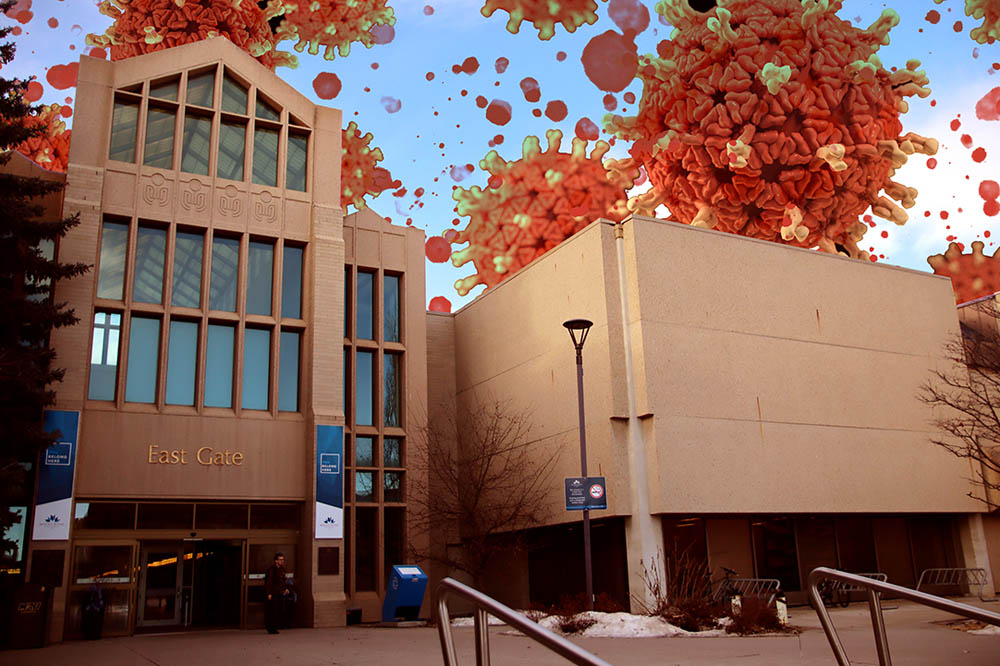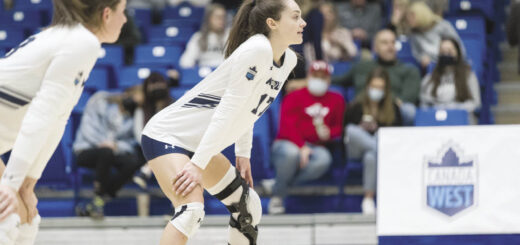MRU moves away from in-person class in midst of COVID-19 pandemic
By Noel Harper, Staff Writer
The numbers and information used in this article were accurate as of March 17, but continue to change over time. Visit the Government of Alberta’s COVID-19 webpage for the most updated information.
The world at large has been interrupted by the spread of COVID-19.The novel coronavirus was declared a pandemic by the World Health Organization on March 11, has been contracted by 74 people in Alberta, 424 in Canada and over 160,000 around the world as of March 17. Over 6,500 people have died from the virus.
Alberta’s Chief Medical Officer of Health, Dr. Deena Hinshaw, announced on March 12 that all gatherings of 250 people or more will be canceled, as well as those with 50 or more attendees that include high-risk populations — such as seniors and international travellers — in an effort to stop the spread of COVID-19. All travellers returning to Alberta will be asked to self-isolate for 14 days.
On March 15, the province canceled all in-person post-secondary classes, keeping large groups of students away from campuses. All K-12 school classes are also canceled indefinitely. In accordance with information provided to them by Alberta Health Services, MRU began a mandatory transition to alternative course delivery starting on March 17, meaning the final quarter of the semester will be completed remotely.
“Campus remains open, but students are advised not to come unless necessary,” said the latest statement from MRU President and Vice-Chancellor Tim Rahilly, sent on March 16.
Update: Campus is open but students are advised not to come unless necessary. The @MRULibrary is open. @MRUrecreation is closed. Residence is open but it is extremely important that students in Residence practice social distancing of two metres apart. https://t.co/nhtz06x5CU pic.twitter.com/hiuJe4Dzfh
— Mount Royal U (@mountroyal4u) March 17, 2020
SAMRU will keep Wyckham House centers and businesses open, alongside all non-academic operations at MRU, for now. Clubs have been asked to cancel all upcoming events and in-person meetings. Those who must be on campus are being advised to stay two meters from other individuals and wash their hands frequently and thoroughly. MRU has not reported a case of COVID-19 within its community at the time of publishing.
When Annalise Van Ham, MRU’s Vice-President of Finance and Administration, spoke to the Reflector on March 13, she said it was unnecessary for MRU to transition at the same time as other Alberta universities, several of which did so the previous day.
“[With] our classrooms, there’s very few that even exceed 50, and so the scale of potential risk is very different here,” said Van Ham.
MRU’s Budget Town Hall and a showing of The Witness Blanket exhibit were among the events on campus that were canceled last week. There is currently no timeline to reschedule them.
As the campus remains open, “students can use the computer labs, which are receiving enhanced cleaning,” the university says.
For those without reliable internet outside of MRU who cannot come in, Van Ham said, “I would hope and imagine that most students have access somewhere, whether in their own home or in public settings, to Wi-Fi.”
If campus must close, Van Ham says “We’ll address it at that time, if that becomes a barrier.”
Many MRU professors opted to create contingency plans before the provost authorized faculty to finish teaching their courses remotely. Some faculty members expressed their disagreements with the university’s decision to delay this decision.
I’ve decided that I’m going to teach Monday, say a heartfelt goodbye to my classes, and then take them online for the rest of the semester. @mountroyal4u may not be looking out for their safety (or mine), but I sure as hell will.
— Tim Haney (@timhaneyphd) March 14, 2020
“I’ve decided that I’m going to … take [classes] online for the rest of the semester. [MRU] may not be looking out for their safety (or mine), but I sure as hell will,” tweeted Sociology professor Tim Haney on March 13.
According to Van Ham, the academic team at the city’s Emergency Operations Centre is currently working on how to administer final exams and other assessments during the distancing period. Some exam settings would exceed the government’s 250 people guideline and would need to be invigilated differently.
“It will differ depending on the nature of the assignment, the nature of the course, and the nature of the examination that would have been normally planned,” Van Ham said.
Craig Jenne, assistant professor in the University of Calgary’s Department of Microbiology, Immunology & Infectious Diseases, says that changes are easier to be made in low-risk situations, rather than retrospectively responding to a risk that is already in the community.
“[We are] recognizing that although the threat in Alberta is low, the threat of acquiring this disease through travel and bringing it home is actually quite high,” Jenne says.
On the response from post-secondary institutions, Jenne asks, “Will it be adequate? Currently, it is. A week or two from now, the current decisions may not be enough.”
Sanitizing large facilities to prevent further spread of the virus, according to Jenne, will be easier than cleaning up after ailments like influenza or measles.
“We’re not seeing the same degree of spread. [With] measles, if somebody was to walk in a room and cough, that room would literally have a risk for hours … This is more of a contact transmission,” he said.
MRU has sent email updates regarding COVID-19 daily since March 11, and has also created an address — covid19@mtroyal.ca — to respond to concerns from students, faculty or staff.
For more information on MRU’s updates about COVID-19, please visit: mtroyal.ca/COVID19
If you are experiencing COVID-19 symptoms, call HealthLink 811 and follow all guidelines set out by Alberta Health Services. If you recently traveled outside Canada or were exposed to someone known to have COVID-19, do not leave your home for the next 14 days.




